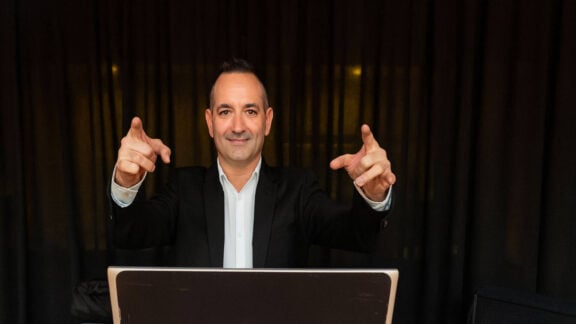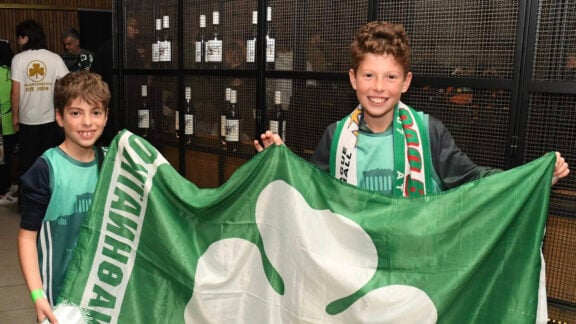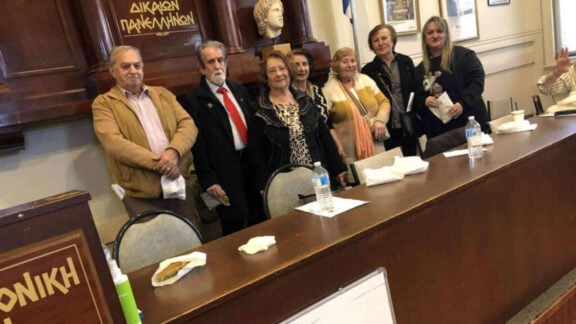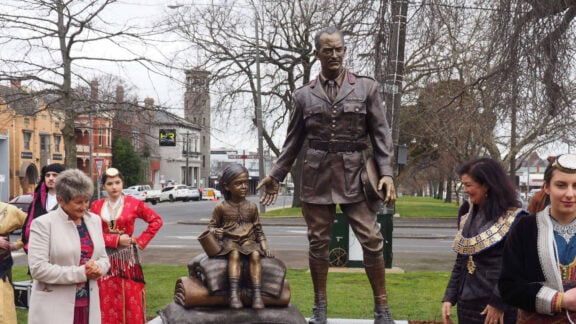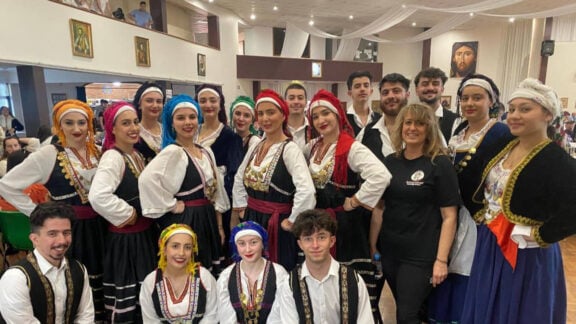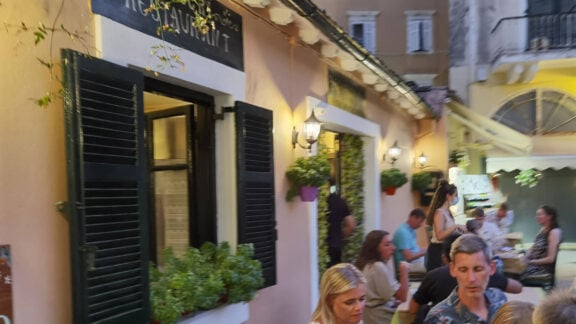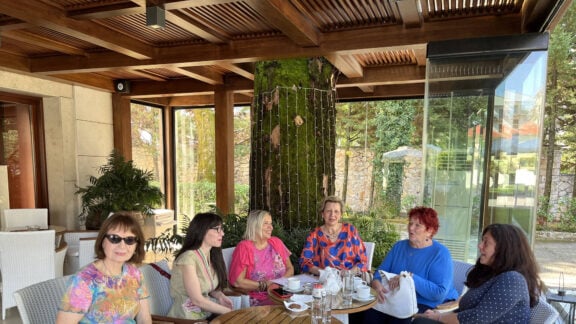Dearest mainstream journalists who posit that ‘wog’ is a term of endearment,
One of the first “wogs” I met, was my father, who at the tender age of six was ordered off a Melbourne tram, along with his father, for having the temerity to speak to him in the only language he knew, Greek, in this fashion: “We speak English in Australia you bloody wogs. Get off.” At that time, my family had only been in Australia for two years, so the endearing intent behind the injunction was lost on my father. Similarly, in high school, when his classmates fulminated against the “f….g wogs,” only to modify their position upon being the recipients of his fists, with an: “but you’re alright,” he criminally failed to appreciate the jocular, endearing way in which this was intended. Incidentally, to this day, my father refuses to watch the epic film “Lawrence of Arabia,” because of the scene where T.E Lawrence walks into the ‘no-wogs’ bar (again, that is meant in the nicest possible way), and announces he has taken Aqaba in the following terms: “We’ve taken Aqaba… the wogs have.” Regardless of how much I try, I am unable to convince him that the British army meant the word as a term of affection for the Arabs, whose countries they would go on to appropriate for themselves. Funny that.
In his memoir, “Call me Emilios,” His Honour Justice Emilios Kyrou of the Victorian Supreme Court of Appeal, also vividly describes how he failed to realise that the constant beatings and name-callings he endured at his school for being a “wog,” which resulted in him changing his name in an attempt to efface his ethnic identity, were merely the effusions of the generosity of the Australian spirit. In a sense, His Honour should be profoundly grateful for the privilege of being called a ‘wog’ and being roughed up as a result, for it gave him the motivation to seek to defy the contemporary preconceived notions of a wog’s proper place in society and become of the keenest legal minds of his generation. I extend, unsolicited, my thanks on his behalf.
Likewise, in her recent maiden speech to Federal Parliament, Greek-Australian Liberal MP Julia Banks describes her own special relationship with the word ‘wog,’ and how she sought its meaning in a dictionary: “Incredulously, I read the definition over and over: “Someone of dark skin who is foreign to the land on which he lives.” I was hurt more by the tone of the word and less by its definition. I felt ugly, scared and very alone.” Notice a pattern here dearest mainstream journalists? We “wogs” seem unable to understand the unique Australian communication of affection. Julia Banks in a case in point, because in more recent times, mysteriously contemporaneous with when “wog” became a term of endearment, as a junior lawyer, her car was attacked by unionists who in her own words: “They threw my car, rocked it backwards and forwards and slammed their faces against the windows as they called me a wog.” For some reason, Julia Banks seemed sufficiently moved by this outpouring of tolerance and inclusiveness that she also chose to relate this love story in her maiden speech.
Furthermore, dearest mainstream journalists, when I, born and bred in Oz, wear the Greek national costume for the Greek Independence Day march to the Shrine of Remembrance, which has taken place in Melbourne for over four decades, I will be invariably be accosted by well meaning Sunday strollers with the words: “F……g poofter wog. Why don’t you go back to your own country?” When I do return to my ancestral homeland, which is the municipality of Moonee Valley, in which my family has resided for sixty two years, I usually reflect upon how the expression of such terms of endearment create an unprecedented sense of intimacy and connectedness with the broader Australian zeitgeist. I suspect this has something to do with how well my bestockinged legs look in a skirt and suspect them, that I asked for it. Similarly, I am always astounded at the level of affection displayed when discussing the merits of Australian political parties with my parents on the way to the polling booth on election day, well meaning citizens diligently remind us: “We speak English in Australia you b….y wogs.” I had the honour of witnessing a gentleman also direct those same loving words of endearment at my then two year old daughter at last year’s local ANZAC Day festivities, proving that age is no boundary to lapping up the type of love you so celebrate.
Dearest mainstream journalists, I applaud you for celebrating just how endearing the word ‘wog’ is in the mainstream print media. Finally, pronouncements such as “all wog parents are strict, wog parents don’t give their kids enough freedom, (from psychologists,) wogs shouldn’t speak their wog languages because it confuses them when they speak English, (from teachers) wogs are experts at rorting the system (from a centrelink employee), ‘geez you wogs smother your kids in clothes (from a doctor) and I love wog food, (almost anyone invited to our homes)” all fall into perspective, though I confide in you that I am yet to comprehend what a “chocko wog” is. This is important, because apparently, I am one. I’m sure it’s something exceedingly beautiful, just like me in my ‘wog’ skirt.
Imagine how ecstatic I was to learn that the term ‘wog,’ was first noted by lexicographer F.C. Bowen in 1929, in his Sea Slang: a dictionary of the old-timers’ expressions and epithets, where he defines wogs as “lower class Babu shipping clerks on the Indian coast.” This makes me happy, both because I have an abiding fascination in the cultures of the Indian subcontinent, and because a Second World War veteran who was hidden by Greek villages in Crete at the risk of their lives during that war, once told me, after a passenger on the tram derided me for daring to read a book in ‘wog,’ that ‘wog’ was a colloquial expression for a disease, and I’d rather be a Gujarati-speaking bureaucrat than syphilis, any day. I was going to go with the common cold here, but I assure you, there is nothing common about us ‘wogs.’
What is especially endearing about applying the word ‘wog’ to us, dearest mainstream journalists, is that the love is spread so far and wide. Indeed, the broadness of its application is breathtaking. It is efficiency itself. Instead of having to differentiate between Italians, Greeks, Maltese, Turks, Croatians, Serbians, Bosnians, Albanians, Turks, Kurds, Armenians, Persians, Lebanese…etc, one collective noun is all that is required to speed your love from your lips and into our hearts, decimating the differences in language, culture, religion and gender between us and re-casting us in one, easily accessible, Aussie-forged image, all the better to relate to us with, similar in fashion to how in 1949, British MP George Wigg said of Winston Churchill: “The Honourable Gentleman and his friend think they are all ‘wogs’. Indeed the Right Honourable Member for Woodford, thinks that the ‘wogs’ begin at Calais.” This is instructive because I’ve always wondered where the borders of Woglandia begin. As well, for some obscure reason, I’ve been brought up to be proud of my Greek heritage. I feel now, that this is a grave mistake. Had I been brought up to be proud of being a ‘wog,’ I would not have missed out on appreciating all that love. And sometimes, that’s just all you need.
The archetypal ‘Wogboy’ himself seems to agree with you dearest mainstream journalists. Nick Giannopoulos once commented: “I think by defusing the word ‘wog’ we’ve shown our maturity and our great ability to adapt and just laugh things off, you know… When I first came [to Greece] and I started trying to explain to them why we got called ‘wog’ they’d get really angry about it… But then when they see what we’ve done with it—and this is the twist—that we’ve turned it into a term of endearment, they actually really get into that…”
Certainly, there is great comedic release in ‘wogs,’ saying the word wog, for after all the best type of comedy is that which arises from a release of tension, in this case, the realisation by the coiner that his term registers as one of endearment to the intended recipient, just as the ‘n’ word is used in the United States. In a conversation I had some time ago with another archetypal ‘wog,’ George Kapiniaris, we mused over just how mainstream and metrosexual the descendants of the ‘wogs’ that they portrayed with such acclaim in the eighties have become, to the extent where their forebears would neither recognise them or relate to them.
This engenders in me feelings of deep disquiet. For disturbing evidence appears to suggest that while the members of the communities referred to collectively as ‘wog’ are slowly evolving, not only due to their acculturation in this wide brown land of y/ours, but also as a result of increased ability to maintain links with the rest of the world. I fear that we members of those communities are gradually morphing and melding into something that no longer resembles the traditional image of the ‘wog’ as historically defined by Australian society and hallowed in ‘Kingswood Country,’ ‘Home Sweet Home’ and ‘Acropolis Now,’ but rather has a weird and warped dynamic of its own. And herein lies the rub: I’m not so sure I can live up to the image you are so enamoured of, but I’m dead as hell sure I cannot live without your love. And so, dearest mainstream journalists, all that I ask of you is this: If I cannot be the wog you so desire me to be, will you still love me tomorrow?
Yours stereotpyically,
A wog (of the chocko sub-species).

